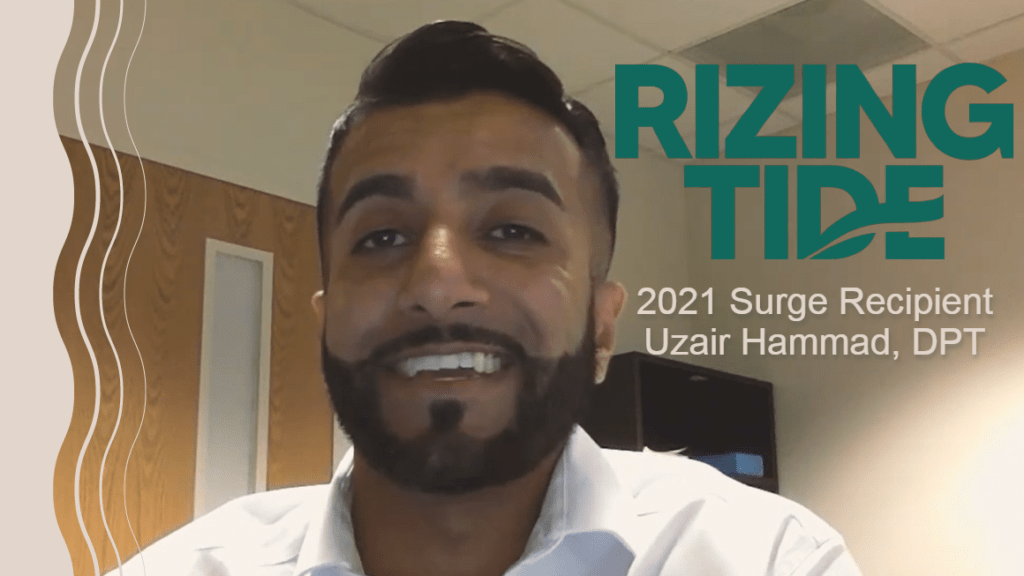
A Journey into Neurological PT: Meet Rizing Tide Scholar Uzair Hammad
This is the sixth installment of Rizing Tide’s Lighthouse Series which spotlights our exceptional scholars. Stay tuned for the next installment!
Dr. Uzair Hammad didn’t always know which PT specialty he wanted to pursue—but today, he’s completing his neurological physical therapy residency with the University of Central Florida and the Orlando Health Regional Medical Center. He found his passion for neuro PT late in PT school after he started exposing himself to many different PT settings and patient populations. After his final clinical Uzair realized he wanted to work with the neurological patient population. “I feel like I get to be their go-to person, so to speak, after a devastating event. And the concept of helping them get their life back, literally step by step, just instills this inner drive and passion in me to get up in the morning.”
Uzair’s drive to attend a residency came from his desire to ensure that he does right by his patients and serves them to the best of his abilities. He also wanted to quickly become an expert in the field and accelerate his plan to one day own a PT practice. But even though his vision was clear, choosing a residency was no easy task. He evaluated each option on his own personal criteria. “I definitely was more attracted to the ones that offered a didactic component or an opportunity to be involved in teaching,” Uzair says. Additionally, he spent a lot of time researching each residency’s individual mentors, focusing on their areas of expertise, qualities, goals, and why they joined the program.
Residencies can provide PT students with many unique learning opportunities. Uzair says that his residency program has helped him develop his teaching and presentation skills through various opportunities—like cohosting the ANPT podcast, for instance. While Uzair sees his career maturing at an accelerated rate, he’s finding that it’s challenging to juggle a treatment schedule in addition to lectures, meetings, and extra development work. “Although all those things are super valuable, just going through them all has definitely been the most challenging part,” Uzair says. “Accepting myself as an expert has been surprisingly challenging as well,” he adds.
Uzair believes that a successful resident is a physical therapist who is willing to receive (and act on) constructive criticism and feedback—though it’s also important that the residents firmly understand why they’re attending the program. “My main piece of advice would be to really spend time asking yourself why you want to pursue a residency,” Uzair says to physical therapists who’re considering attending a residency program. Uzair believes this self-reflection should happen before the residency application and interview process—and he advises prospective residents to weave it into their interview preparation. During the interview itself, he suggests this: “Most importantly be yourself because they will not remember what you said during these things, but they will definitely remember how they felt when you spoke.”
When working with patients, Uzair believes that humility is one of the most important qualities a physical therapist can have as it can help you actively listen to their patients. “It allows me to open my mind when I’m talking to them and, you know, acknowledge the fact that they have just as much to teach me as I have to teach them.” Along with humility, Uzair says that empathy is also essential for a physical therapist. “Honestly, patients notice when a practitioner is being empathetic, and it can really be the difference-maker in getting that buy-in and in helping that patient gain trust in your care.”
As a Rizing Tide Surge Scholar, Uziar says that he’s seen an improvement to his self-worth, and he feels encouraged to vigorously pursue his professional goals. “It means the world to me to know that I’m not alone and that I’m supported and that someone else out there believes in me and what I have to offer.” After his residency, Uziar plans to continue working as a neuro PT and pursue his dreams of opening a pro bono clinic.

